“Di Stéfano, Charlton, Kopa... it was very difficult to win the Ballon d' Or back then”
The AS Sports Awards is 10 years old and to mark the occasion, Spain's only Ballon d'Or winner Luis Suárez will be the guest of honour at Monday's Gala.
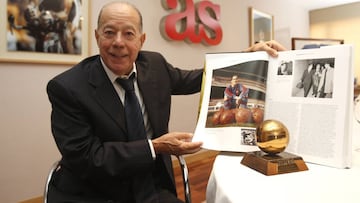
The AS Sports Awards celebrates 10 years and to mark the occasion, Luis Suárez, the only Spanish player to have won the Ballon d'Or, will be the guest of honour at Monday's gala. AS had the pleasure of speaking to him about his career and how it felt to be named the best European player on the planet in 1960.
What was the district of A Coruña in which you grew up like?
It was called Monte Alto! A few metres from where I was born there was a weapons factory. It was a working class neighbourhood, nobody had a bicycle or even a football.
How did you play?
I was born in 1935, so it was a very peaceful place, there were no cars, and we could play in the middle of the street.
Did you have a football?
No, no… We made them out of scraps of cloth - old dishcloths sewn together…
What did your parents do for a living?
We had a butcher's shop. We had just enough to be able to eat but not enough to make any money. I remember my mother with her little accounts book, trying to calculate how we were going to get by because customers always paid one week late. People always paid, they were honest and humble but sometimes payments came in late. It was just after the [Civil] war.
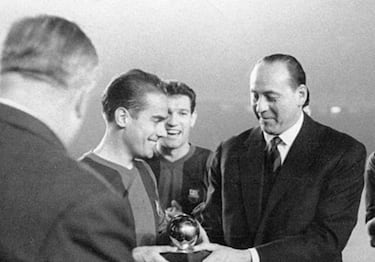
Where did you start playing more seriously?
We joined in with the priests, at Santo Tomás church, because they had a real leather football, chess board, table tennis, draughts… We started hanging out there. And they were involved in their own championship so we played with that team, 'Perseverancia de Santo Tomás' they were called.
What a very 'seminary' name for a football team!
(Laughs) It was the bosses who came up with the name…
You must have been very young when you joined Deportivo?
Yes, I was about 13 or so. At that time, an Argentine coach called Alejandro Scopelli came to train Depor and he had the idea of starting some kind of football school… He put an advert in [local newspaper] La Voz de Galicia calling all kids of a certain age. Loads of us turned up and we started creating two teams - the club took 22 of us.
The staff also decided to watch us play before Deportivo's season started. As a curious aside, also in that group was Adolfo Suárez, who went on to become Spain's Prime Minister.
Was he any good?
He wasn't bad, quite good… But he didn't stay long because his parents moved to. The group was called the 'Scopelli School'.
And from there you joined Depor?
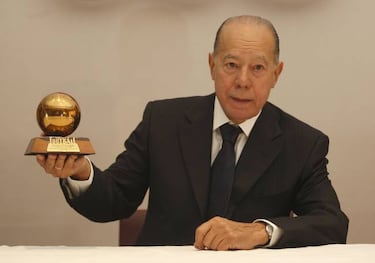
I had to wait until I was old enough to join the Under-18s.
Which other players were in that Depor side?
Arsenio Iglesias and Pahiño, for example.
What was Pahiño like as a striker?
Well, Pahiño was older than Arsenio. I would have been about 16 or 17 and he was always very gentle and kind to me - he treated me really well. He was tremendous inside the area. As a kid, I'd already watched him play for Real Madrid in A Coruña. Can you imagine it? here was me with these players who not long before I was asking for their autographs - we used to do that because we had no television back then.
Who took you to Barcelona?
There was a textiles factory manager who was a director at Barcelona; he had done his military service in A Coruña and used to visit quite frequently with his business. He also used to go to restaurant in the ity centre called Fornos, and the people there told him: “Hey, there's a young kid here who plays football...”. And he went back to tell Barcelona.
Destiny…
I made the connection that my first game for Depor in official competition was in Les Corts against Barça. They put four past us but I did something during that game… and they followed me closely after that.
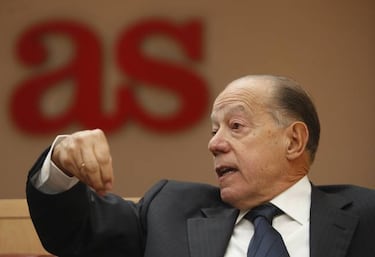
Didn't Real Madrid want to sign you?
I heard that Ipiña, who was their Technical Secretary, came up to A Coruña to watch me in a game and that day I had a bad game. I was being man-marked by this real dimwit who played for Valladolid, called Ortega - he marked me really well and wouldn't let me get near the ball.
I'm going to be a little cheeky here - would you have liked to have played for Real Madrid?
Hey! At that age I would have gone wherever anyone wanted me - Madrid, Barcelona… To be able to go to Barça, I was part of operation that took Dagoberto Moll to Barcelona; a fantastic right winger - a great player. He still lives in A Coruña. Whoever it was who signed him said: bring the kid along too.
What was it like arriving in Barcelona?
There was Kubala, César, Ramallets, Biosca, Segarra… Just like what happened to me with Pahiño, a few months earlier I had been going crazy getting all of these players' autographs in A Coruña...
I guess even they could not have imagined that you would eventually be the only Spaniard to win the Ballon d'Or…
(Laughs). At that time no, obviously. At the start I wasn't playing very often, just in the Copa del Rey. I struggled, because in those days there were no substitutions or anything like that and I was only a young kid…
When it it all start to change?
When Helenio Herrera arrived. He was the one who gave me the launch I needed and gave me confidence. He was the key. I was 21 and he took me to one side and spoke to me: “I've got a lot of faith in you so prepare yourself…”. And I responded to the faith he placed in me, of course…
Did he change your style of play?
No, I was a left winger, but I always wore the number 10 jersey, which was the playmaker's number. Pelé was the first No.10 who played alongside the centre-forward.
If you had to compare yourself to a player from the modern era, who would it be?
Well I'd probably say, Pirlo, or maybe [Sandro] Mazzola. e had a lot of things I had in my game… Later, perhaps Iniesta, but he plays a little further forward… You know what? back then I suppose I was a mixture of Xavi and Iniesta!
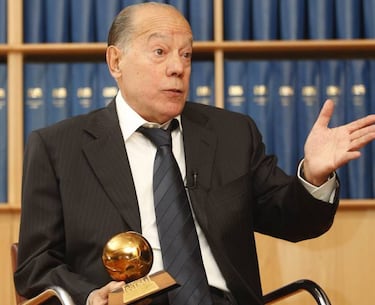
You were nominated for eight consecutive Ballon d'Ors from 1958 to 1965. Who were your rivals?
Blimey, Alfredo, Puskás, Charlton, Kopa, Uwe Seeler… In that era it was very tough to win the Ballon d'Or, there were so many great players all over Europe. And on top of that the organizers tried not to award it to the same player two years running. But Di Stéfano was so good that they had to give it to him two consecutive times.
How did you get on with La Saeta Rubio?
Great, really well… We had a great relationship whenever we met or coincided in the national team. I had great respect and admiration for him. I have always said that he is the best player I have ever seen or ever played alongside.
What was it like playing alongside Di Stéfano?
He could do everything - everything. If you could list the 10 best qualities a player could possess, maybe he wouldn't get 10 out 10 in every one, but he would get a nine in all 10 of them. He was an incredibly complete footballer. And so was Pancho Puskás - he could really blast the ball hard and he was blessed with amazing quality and excelled in some aspects, but not in others. Alfredo did everything almost perfectly.
How did you find out that you had won the 1960 Ballon d'Or?
A correspondent from L’Équipe [Andreu] Mercé Varela came down to one of our training sessions in Barcelona, and he told me that I had a good chance of winning it. The following month he was back and told me I'd won it. The Editor from the newspaper came down and handed me the award just before a game. I handed it to the masseur, played the match, got it back from the masseur after the game and went home, that was that, there was no party or celebration.
Straight back to work as it were…
I always joke that they might have at least invited me to dinner!
There was no cash prize?
No, no… But you know, it was already a very important prize to win. I have won more in terms of notoriety for being the only Spanish player to have been awarded it.
Do you think that's fair?
In 2010 when Spain won the World Cup, and Messi, Iniesta and Xavi were finalists, one of the two Spaniards really should have won it.
They also owe you one…
Yes! In 1964. I was a little surprised by that. I was at Inter and that year we won the league, the European Cup, the Intercontinental Cup against Independiente over two legs, and on top of that I won the European Championships with Spain - every trophy you could possibly win! And they gave the Ballon d'Or to Denis Law!
Related stories
What does it mean to you to be awarded the Diario AS Legend Award?
It's a great honour because it is an important award. It represents an entire career. I'm really excited about it. We must have done something at some point in our lives… I've been getting a few awards lately and it makes me think that because I am getting on, people want to give me these things before I die! (laughs). It makes me feel very happy to be given recognition by others for what I've done in football.
